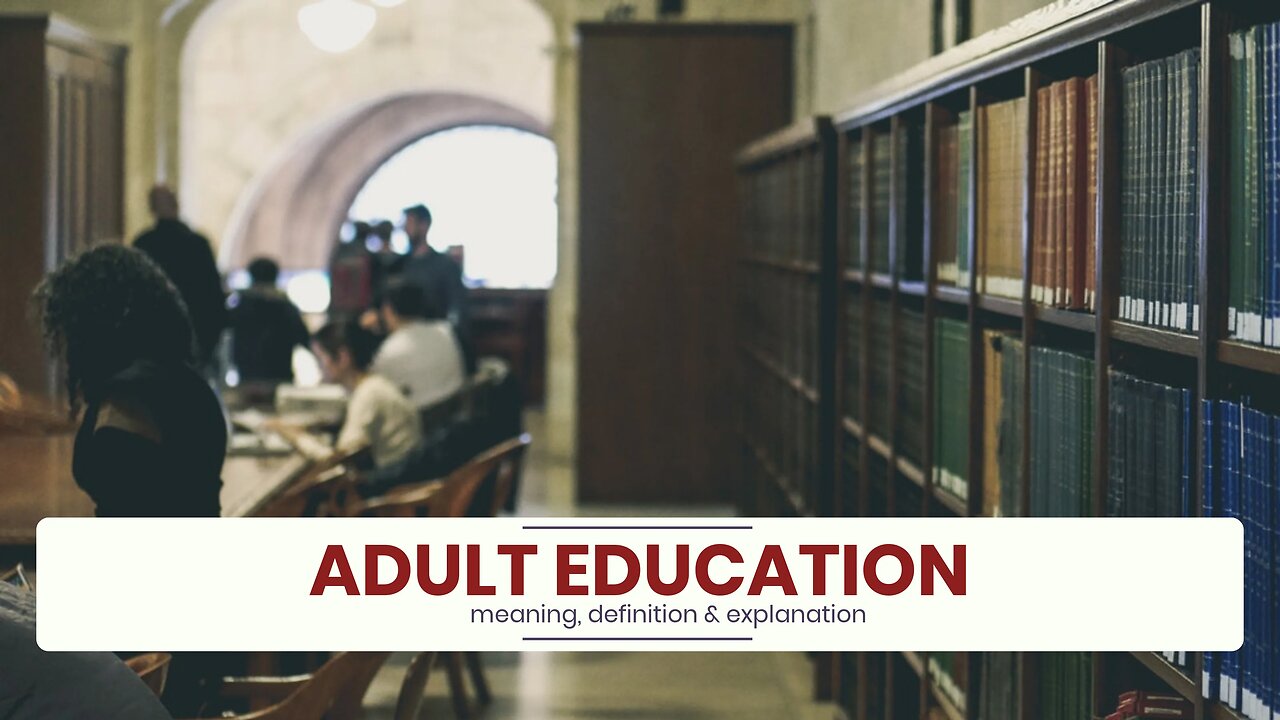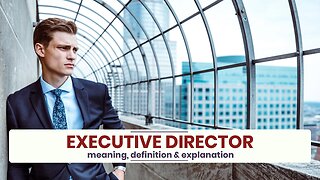Premium Only Content

What is ADULT EDUCATION?
✪✪✪✪✪
http://www.theaudiopedia.com
✪✪✪✪✪
What does ADULT EDUCATION mean? ADULT EDUCATION meaning - ADULT EDUCATION definition - ADULT EDUCATION explanation. What is the meaning of ADULT EDUCATION? What is the definition of ADULT EDUCATION? What does ADULT EDUCATION stand for? What is ADULT EDUCATION meaning? What is ADULT EDUCATION definition?
Adult education is a practice in which adults engage in systematic and sustained self–educating activities in order to gain new forms of knowledge, skills, attitudes, or values. It can mean any form of learning adults engage in beyond traditional schooling, encompassing basic literacy to personal fulfillment as a lifelong learner. In particular, adult education reflects a specific philosophy about learning and teaching based on the assumption that adults can and want to learn, that they are able and willing to take responsibility for that learning, and that the learning itself should respond to their needs. Driven by what one needs or wants to learn, the available opportunities, and the manner in which one learns, adult learning is affected by demographics, globalization and technology. The learning happens in many ways and in many contexts just as all adults' lives differ. Adult learning can be in any of the three contexts, i.e.
Formal – Structured learning that typically takes place in an education or training institution, usually with a set curriculum and carries credentials;
Non-formal – Learning that is organized by educational institutions but non credential. Non-formal learning opportunities may be provided in the workplace and through the activities of civil society organizations and groups;
Informal education – Learning that goes on all the time, resulting from daily life activities related to work, family, community or leisure (e.g. community baking class).
Defined as the science and art of helping adults learn, the practice of adult education is referred to as andragogy, to distinguish it from the traditional school-based education for children pedagogy. Unlike children, adults are seen as:
More self-directed, rather than relying on others for help
Mature and therefore experienced with the experience providing a rich source for learning
An Adult's readiness to learn is linked to what one needs to know
Adult orientation to learn is problem centred rather than subject centered
Adult motivation to learn is internal.
Educating adults differs from educating children in several ways given that adults have accumulated knowledge and work experience which can add to the learning experience. Another difference is that most adult education is voluntary, therefore, the participants are generally self-motivated, unless required to participate, by an employer, for example. Adults frequently apply their knowledge in a practical fashion to learn effectively. They must have a reasonable expectation that the knowledge they gain will help them further their goals. For example, during the 1990s, many adults, including mostly office workers, enrolled in computer training courses. These courses would teach basic use of the operating system or specific application software. Because the abstractions governing the user's interactions with a PC were so new, many people who had been working white-collar jobs for ten years or more eventually took such training courses, either at their own whim (to gain computer skills and thus earn higher pay) or at the behest of their managers.
-
 1:52
1:52
The Audiopedia
7 months agoWhat is EXECUTIVE DIRECTOR?
531 -
 2:38:54
2:38:54
TimcastIRL
2 hours agoElon Secret Child Scandal ERUPTS, Ashley St. Clair Story Goes Viral w/Bethany Mandel | Timcast IRL
74.2K68 -
 2:04:52
2:04:52
Kim Iversen
5 hours agoElon's Pumping Out Babies Like They're Tesla Model 3's | EU Panics Over Peace Talks, Wants More War
56.9K56 -
 LIVE
LIVE
Man in America
7 hours agoFort Knox & Trump’s Secret Gold Move—The Financial Reset NO ONE Is Ready For?
2,485 watching -
 DVR
DVR
Flyover Conservatives
21 hours agoIs America Following The Footsteps of The French Revolution? - President’s Day Special - Historian Bill Federer | FOC Show
17.7K1 -
 2:21:20
2:21:20
Robert Gouveia
4 hours agoTrump Goes to SCOTUS! Judge CAVES on DOGE? Fani Willis Not Happy!
55.6K15 -
 20:41
20:41
Stephen Gardner
4 hours ago🔥You Won't BELIEVE What JUST Happened To Don Trump Jr.!!
55.6K102 -
 58:00
58:00
The StoneZONE with Roger Stone
2 hours agoEuropean Leaders Resist Trump Peace Overtures To Their Own Demise | The StoneZONE w/ Roger Stone
32.7K2 -
 9:29
9:29
AlaskanBallistics
4 hours ago $0.15 earnedWyoming Suppressors and Rifles at Shot Show 2025
28.9K2 -
 1:06:40
1:06:40
Donald Trump Jr.
8 hours agoThe Left is Taking one L After Another, Live with Michael Knowles | Triggered Ep. 217
127K93